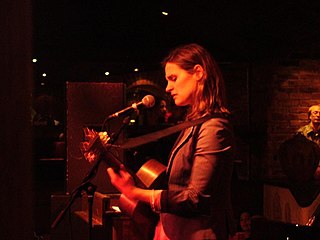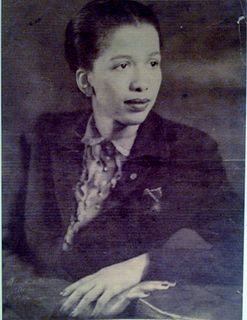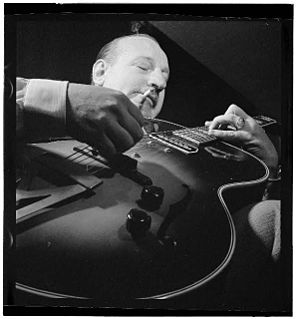Related Research Articles

Eleanora Fagan, better known as Billie Holiday, was an American jazz singer with a career spanning nearly thirty years. Nicknamed "Lady Day" by her friend and music partner Lester Young, Holiday had a seminal influence on jazz music and pop singing. Her vocal style, strongly inspired by jazz instrumentalists, pioneered a new way of manipulating phrasing and tempo. She was known for her vocal delivery and improvisational skills, which made up for her limited range and lack of formal music education.
"Stormy Weather" is a 1933 torch song written by Harold Arlen and Ted Koehler. Ethel Waters first sang it at The Cotton Club night club in Harlem in 1933 and recorded it that year, and in the same year it was sung in London by Elisabeth Welch and recorded by Frances Langford. Also 1933, for the first time in history the entire floor revue from Harlem's Cotton Club went on tour, playing theatres in principal cities. The revue was originally called The Cotton Club Parade of 1933 but for the road tour it was changed to the Stormy Weather Revue and as the name implies, the show contained the hit song "Stormy Weather" which was sung by Adelaide Hall.

Lady Sings the Blues is a 1972 American biographical drama film directed by Sidney J. Furie about jazz singer Billie Holiday, loosely based on her 1956 autobiography which, in turn, took its title from one of Holiday's most popular songs. It was produced by Motown Productions for Paramount Pictures. Diana Ross portrayed Holiday, alongside a cast including Billy Dee Williams, Richard Pryor, James T. Callahan, and Scatman Crothers.

Charles James Shavers was an American swing era jazz trumpeter who played with Dizzy Gillespie, Nat King Cole, Roy Eldridge, Johnny Dodds, Jimmie Noone, Sidney Bechet, Midge Williams, and Billie Holiday. He was an arranger and composer, and one of his compositions, "Undecided", is a jazz standard.

Madeleine Peyroux is an American jazz singer and songwriter who began her career as a teenager on the streets of Paris. She sang vintage jazz and blues songs before finding mainstream success in 2004 when her album Careless Love sold half a million copies.

Carmen Mercedes McRae was an American jazz singer. She is considered one of the most influential jazz vocalists of the 20th century and is remembered for her behind-the-beat phrasing and ironic interpretation of lyrics. McRae was inspired by Billie Holiday, but she established her own voice. She recorded over sixty albums and performed worldwide.
Patty Waters is a jazz vocalist best known for her free jazz recordings in the 1960s for the ESP-Disk label.
"The Way You Look Tonight" is a song from the film Swing Time that was performed by Fred Astaire and written by Dorothy Fields and Jerome Kern. It won the Academy Award for Best Original Song in 1936. Fields remarked, "The first time Jerry played that melody for me I went out and started to cry. The release absolutely killed me. I couldn't stop, it was so beautiful."
John Elbert Collins was an American jazz guitarist who was a member of the Nat King Cole trio.
Virginia Louise "Midge" Williams was an African-American swing and jazz vocalist during the 1930s and 1940s. Although not as famous as other jazz recording artists, Williams was a respected singer and her group, Midge Williams and Her Jazz Jesters, made several well-received recordings during the late 1930s.
Remo Paul Palmier was an American jazz guitarist.
Mary Stallings is an American jazz vocalist and mother of soul singer Adriana Evans.
Herbert Harper was an American jazz trombonist of the West Coast jazz school.
Curtis Reginald Lewis, American composer of popular songs, many of which have become jazz standards. He grew up in Chicago and came to New York City in the 1940s. Lewis subsequently became one of the first black composers and lyricists to own a music publishing company on Broadway in the early 1950s.

Irene Higginbotham was an American songwriter and concert pianist. She is best known for co-writing the Billie Holiday song "Good Morning Heartache" (1946).
Everett Barksdale was an American jazz guitarist and session musician.

Carl Kress was an American jazz guitarist.

Lady Sings the Blues (1956) is an autobiography by jazz singer Billie Holiday, which was co-authored by William Dufty. The book formed the basis of the 1972 film Lady Sings the Blues starring Diana Ross.
Kermit "Scotty" Scott was a jazz tenor saxophonist. Dizzy Gillespie considered Scott “one of the founders of our music” [bop].

Bop City was a jazz club operated by John "Jimbo" Edwards in San Francisco from 1949 to 1965. It was situated in the back room of a Victorian house at 1690 Post Street, in the Western Addition district. During its heyday, the venue was known for late-night live performances of many popular jazz artists, including Billie Holiday, Louis Armstrong, Chet Baker, and Charlie Parker, and was one of the most famous jazz clubs of its time, being instrumental in popularizing the modern jazz style in San Francisco.
References
- ↑ St. John, Kelly (2002-12-22). "STELLA BROOKS 1910-2002 / Mercurial jazz singer of 1940s dies / Brooks moved in celebrity circles before retiring to S.F. studio". San Francisco Chronicle . Retrieved 2019-03-18.
- ↑ Chadbourne, Eugene. "Stella Brooks: Biography". Allmusic. Retrieved 2010-11-28.